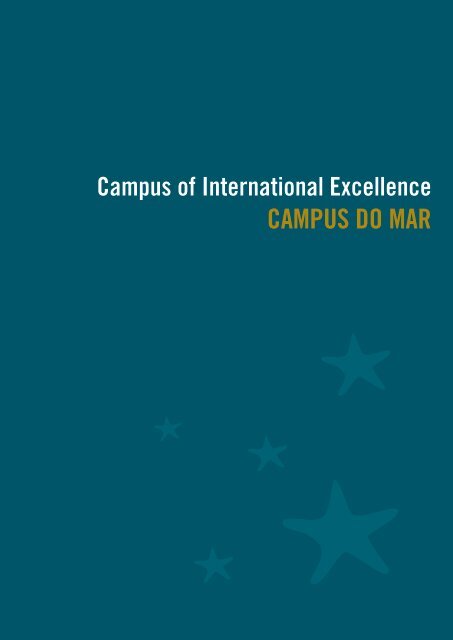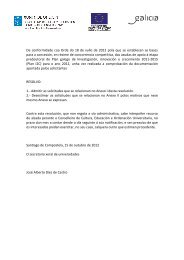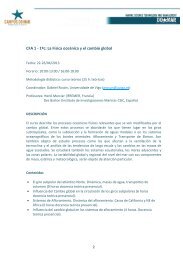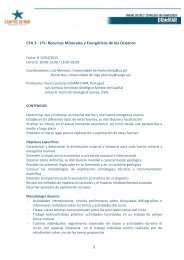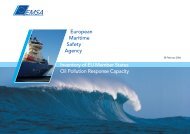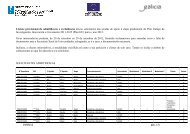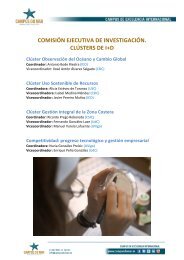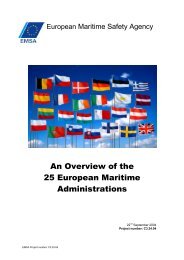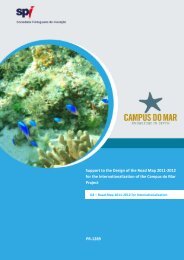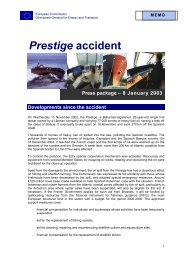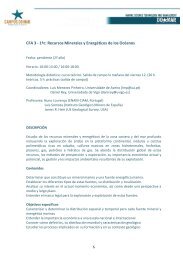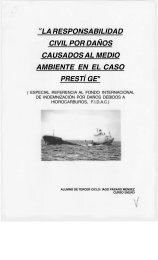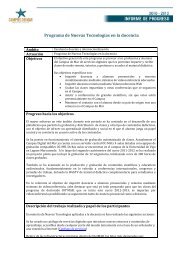CAMPUS DO MAR
CAMPUS DO MAR
CAMPUS DO MAR
You also want an ePaper? Increase the reach of your titles
YUMPU automatically turns print PDFs into web optimized ePapers that Google loves.
SUM<strong>MAR</strong>Y FOR PUBLICATION<br />
Campus of International Excellence<br />
<strong>CAMPUS</strong> <strong>DO</strong> <strong>MAR</strong>
SUM<strong>MAR</strong>Y FOR PUBLICATION<br />
<strong>CAMPUS</strong> OF INTERNATIONAL EXCELLENCE<br />
<strong>CAMPUS</strong> <strong>DO</strong> <strong>MAR</strong><br />
Campus do Mar − a collective experiment towards excellence<br />
When in October, 2010, the international evaluation commission<br />
of the International Campus of Excellence Program issued<br />
a positive assessment to the Campus do Mar’s proposal of<br />
creating a transnational aggregation on marine research, technology<br />
transfer and education, It acknowledged the historical<br />
relationship between the Galicia-Northern Portugal Eurorregion<br />
and the sea and challenged the existing critical mass of<br />
researchers, lecturers and businessmen focussed on marine<br />
activities on a collective path towards excellence.<br />
Human capital, a history linked to the sea and the challenge to<br />
become an International Campus of Excellence, provided the<br />
impetus for establishing this Campus do Mar network, which<br />
was promoted by the three Galician universities, the Spanish<br />
Research Council (CSIC) and the Spanish Oceanographic<br />
Institute (IEO), and which comprises a total of 23 institutions<br />
from Galicia and Northern Portugal. Based on such favourable<br />
starting conditions, During the past two years, Campus do Mar<br />
has laid the foundations for creating a solid R&D aggregation<br />
whose mission is to become an international reference in<br />
marine research.<br />
The first results from this collective experiment are now<br />
becoming a reality. Apart from the consolidation of the<br />
R&D aggregation and the increased research capacity of its<br />
members, their cooperative work has enabled Campus do<br />
Mar to attract funds to the tune of €2,430,000 after an initial<br />
investment of €1,157,000 which effectively demonstrates<br />
the multiplying effect of the project. These results encourage<br />
the implementation of the Campus do Mar strategic plan in<br />
order to achieve the initially scheduled objectives, namely; to<br />
strongly bet on training, employment and talent attraction, on<br />
which more than 40% of the investment has been spent.<br />
This R&D aggregation, with such a high number of participating<br />
actors, requires a solid governance structure in which<br />
the partners feel adequately represented. An organisation<br />
chart has been therefore designed presided by a Governing<br />
Board made up of the heads of each of the five promoter institutions.<br />
Such Governing Body delegates executive functions<br />
to the management team comprised of one director and six<br />
area directors representing the several institutions who in turn<br />
are supported by the various sectorial executive commissions<br />
entrusted with establishing the master plan for each of the<br />
strategic axis of the project.<br />
1<br />
página 174
SUM<strong>MAR</strong>Y FOR PUBLICATION<br />
The Campus do Mar spans a geographic area of more than<br />
300 km distributed along the Atlantic façade of the Iberian<br />
Peninsula and, therefore, needs an advanced connection<br />
system to facilitate collaborative work from a distance and<br />
information exchange among groups. The result of such an<br />
initiative is the Digital Campus do Mar (Digi<strong>MAR</strong>) Unit, which<br />
offers a range of ICT services to the International Campus of<br />
Excellence (ICE) members such as organisation of distance<br />
work meetings, lectures and tutorials. It also provides taped<br />
class material and scientific and teaching content to remotely<br />
located students. Users can likewise access a video library that<br />
contains a total of 669 videos, which amounts to a total of 798<br />
hours of scientific and/or educational content that has been<br />
viewed 314,000 times from 2010 to date.<br />
Research of excellence focussed on the<br />
productive sectors<br />
The more than 3000 researchers currently involved in Campus<br />
do Mar are organised into four clusters that coincide with<br />
the challenges initially identified by the aggregation, namely:<br />
“Ocean Observation and Global Change”, “Sustainable Use of<br />
Marine Resources”, “Integrated Coastal Zone Management”<br />
and “Competitiveness: Technological Progress and Business<br />
Management”. Working groups have been created to define<br />
the research areas, and subsequently draft the corresponding<br />
strategic plans.<br />
New research emergent lines connected with “omic” technologies<br />
applied to the marine field have been initiated in 2012.<br />
About 20 researchers representing 7 Campus do Mar member<br />
institutions met and agreed to start drafting a strategic plan for<br />
this research line during the last quarter of 2012.<br />
Results emerging from the research carried out at Campus do<br />
Mar should directly benefit society and the productive sector.<br />
To that end, a program focussed on transfer of knowledge has<br />
been developed in close coordination with the current specialised<br />
structures. The main action of this program is to set up a<br />
team of innovation managers who, once the selection process<br />
is completed, shall work on improvimg the efffciency of the<br />
transfer of knowledge from the research groups to the productive<br />
sector.<br />
The creation of the Sea Emprende program means that the<br />
Campus do Mar is firmly committed to promoting an entrepreneurship<br />
culture by stimulating initiatives that will lead to new<br />
highly technological companies, in close collaboration with<br />
the Transference Units (OTRIs) belonging to the Campus do<br />
Mar member institutions. An example of this committment is<br />
the Campus do Mar Virtual Incubator of Enterprises which is<br />
currently in the design stage.<br />
<strong>CAMPUS</strong> OF INTERNATIONAL EXCELLENCE<br />
<strong>CAMPUS</strong> <strong>DO</strong> <strong>MAR</strong><br />
62,000 km trip around the world to establish<br />
new alliances<br />
The international vocation of Campus do Mar has led to the<br />
design and implementation of an internationalisation strategy,<br />
which in its first phase identified target countries and then<br />
designed a package of actions to disseminate the strengths of<br />
the R&D aggregation. In a further phase, contacts were established<br />
with relevant institutions aiming at carrying out joint<br />
actions and collaborations that would in turn reinforce the<br />
weight and credibility of the International Campus of Excellence.<br />
The missions to the target countries were the second phase<br />
in this internationalisation process. The Campus do Mar delegation<br />
has so far travelled more than 62,000 km and visited a<br />
total of 29 reference research centres, universities and R&D<br />
finance institutions in Brazil, China and Mexico and has signed<br />
several collaboration agreements. The mission also arranged<br />
the visit of the representatives from the Ocean University of<br />
China in Qingdao who visited Campus do Mar in September<br />
to explore ways for establishing joint degree programs. Such<br />
internationalisation travel will continue in autumn 2012 first to<br />
the Philippines where Campus do Mar will be presented at the<br />
Science for International Development Conference, and then<br />
to Chile where representatives will visit the most relevant institutions<br />
in the country.<br />
The teaching and research capacity of the Campus do Mar<br />
is now present in developing countries where it is carried out<br />
cooperation projects. Between 2010 and 2012 actions were<br />
mainly concentrated in two countries: Colombia and the Cape<br />
2<br />
página 175
SUM<strong>MAR</strong>Y FOR PUBLICATION<br />
Verde Islands. In Colombia, and more precisely in the region of<br />
Antioquia, experts from Campus do Mar carried out the Erica<br />
project, suppoorted by the Spanish Agency for International<br />
Cooperation (AECID). This project performed a diagnosis and<br />
proposed strategies for promoting socioeconomic development<br />
along the Antioquian coast based on issues related to marine<br />
and coastal resources. The action in the Cape Verde Islands<br />
partially funded by the Regional Government of Galicia (Xunta<br />
de Galicia) is oriented towards training PhDs in this African<br />
country. Four researchers from the Cape Verde Islands will<br />
be trained at Campus do Mar with the aim of preparing their<br />
PhD thesis. A Memorandum of Understanding has also been<br />
signed with the Organisation of the Fish & Aquaculture Sector<br />
of the Central American Isthmus (OSPESCA), which represents<br />
7 Central American countries, in order to reinforce marine<br />
research, offer quality academic training, and support for the<br />
implementation of production development initiatives.<br />
A support & welcome office has been created to facilitate<br />
arrival of foreign researchers and students. It provides the<br />
support needed during their initial stay at Campus do Mar by<br />
helping them to get organised.<br />
In 2011, the Campus do Mar was awarded the UNESCO Chair<br />
for Sustainable Coastal Development. The Chair carries out<br />
training and information exchange activities that are related to<br />
programs associated with the main UNESCO areas.<br />
<strong>DO</strong>*<strong>MAR</strong>, the flagship of the future<br />
International Postgraduate School<br />
The <strong>DO</strong>*<strong>MAR</strong> PhD program in “Marine Science, Technology<br />
and Management”, the International Campus of Excellence’s<br />
commitment towards postgraduate training, will start during<br />
<strong>CAMPUS</strong> OF INTERNATIONAL EXCELLENCE<br />
<strong>CAMPUS</strong> <strong>DO</strong> <strong>MAR</strong><br />
this academic year 2012-2013. This is a joint degree program<br />
offered by the three Galician universities, the CSIC, the IEO,<br />
and three universities from Northern Portugal. This program<br />
has been created with a global vision, multi-annual planning<br />
and with an international cross-border objective. The aim of<br />
the program is to develop the best researchers in the different<br />
scientific and technological aspects of the marine area, as well<br />
as their economic and social aspects, with a view to generating<br />
quality research and international impact to provide the<br />
industry with the best tools in a global competition scenario. All<br />
lectures will be delivered in English by renowned lecturers from<br />
the most prestigious institutions worldwide..These lectures<br />
will be broadcasted live and recorded on file to provide easy<br />
access at any time and from any Campus do Mar member<br />
institution.<br />
Students wishing to enrol on the <strong>DO</strong>*<strong>MAR</strong> PhD program<br />
can benefit from a joint grant announcement of Campus do<br />
Mar-Xunta de Galicia, which contemplates the award of 12<br />
PhD research scholarships for studies at any of the promoting<br />
institutions. These three year grants were announced on<br />
the 23rd of July, 2012, and will be financed 80% by the<br />
Department of Education and 20% by the Campus do Mar.<br />
Training, mobility and talent attraction,<br />
investment in human capital<br />
Campus do Mar has encouraged training of professionals on<br />
marine science and technology through the announcement of<br />
35 Master’s scholarships forto carry out studies at the Galician<br />
University System institutions. Twenty-eight EC students and<br />
seven non-EC ones were selected from among 115 applicants.<br />
A second grant announcement was made in 2012 for a total of<br />
17 scholarships in which 103 applications were received from<br />
16 countries.<br />
Campus do Mar provides incentives for the mobility of researchers,<br />
lecturers and students in order to encourage knowledge<br />
exchange. Mobility grants were therefore announced in<br />
2012 and 16 researchers carried out visits at internationally<br />
renowned research centres. Such visits helped them<br />
to improve their level of scientific excellence, increase their<br />
dynamism and their capacity to undertake new lines of<br />
research and to reinforce existing lines. They have also contributed<br />
to a greater market orientation and interaction with the<br />
business community. An increase in the number of students<br />
who visited the premises of Campus do Mar and in those who<br />
visited foreign universities was achieved thanks mainly to the<br />
signing of new reciprocity agreements.<br />
The ten overseas post-doctorate researchers financed by the<br />
EU to carry out their 48 month research at Campus do Mar<br />
3<br />
página 176
SUM<strong>MAR</strong>Y FOR PUBLICATION<br />
institutions will contribute substantially to the talent attraction<br />
program that has helped to reinforce research groups and<br />
establish international networks. This opportunity will not only<br />
enable Campus do Mar to exhibit its full potential but will also<br />
permit the incorporation of top level researchers, thanks to the<br />
900,000 € received from the 7th Framework Program under<br />
the Marie Curie, COFUND actions.<br />
Moreover, Campus do Mar also promotes training and talent<br />
attraction amongst the very young in society. Actions such as<br />
the Summer Science Campus that introduced marine science<br />
and technology to selected secondary school students or the<br />
design of the Novo*Mar program which in the near future will<br />
help connect secondary education students with the Campus<br />
of Excellence are examples of actions oriented at breaking the<br />
traditional barriers that exist between secondary schooling and<br />
higher education.<br />
A sustainable campus created for society<br />
By following the approach of investing in intelligence and<br />
boosting human capital as against infrastructures, all available<br />
funds have been so far invested in training, mobility and<br />
employment for researchers. However, the Campus do Mar<br />
needs to have central headquarters and these will be located<br />
on the premises of the Navy’s former Transmissions & Electronics<br />
School in Vigo. A new sectorial plan has been approved<br />
for the site and negotiations are underway that will eventually<br />
enable the start of fitting-out works in the buildings that will<br />
house the different Campus do Mar research and transference<br />
units.<br />
<strong>CAMPUS</strong> OF INTERNATIONAL EXCELLENCE<br />
<strong>CAMPUS</strong> <strong>DO</strong> <strong>MAR</strong><br />
The creation of a network on marine knowledge goes beyond<br />
just research, teaching and technology transfer. It acts directly<br />
on the social environment and invite people to learn, enjoy<br />
and protect the sea. Therefore, a set of actions was designed<br />
within the strategic campus transformation axis, to disseminate<br />
science and the results of marine researchers via the<br />
mass media, and to generate an environment in which the<br />
sea acquires prominence. Since last year and to that end,<br />
members of Campus do Mar have offered a wide range of activities<br />
for sports, leisure and culture through the CampusMar<br />
Life program.<br />
In short, Campus do Mar is a future commitment that is<br />
already becoming a reality. It is geared towards the creation<br />
of a consortium to respond to the challenges faced by the<br />
acquisition of marine knowledge in the 21st century..Benefiting<br />
from favourable initial conditions, by boosting its strengths,<br />
correcting its weaknesses, and through a firm commitment of<br />
its members towards training, talent attraction and internationalisation<br />
as against betting on large infrastructures, Campus<br />
do Mar has managed to create an environment that invites<br />
to deepen into the knowledge of the oceans with the main<br />
objective of achieving a direct impact on society thus contributing<br />
to its progress<br />
4<br />
página 177


